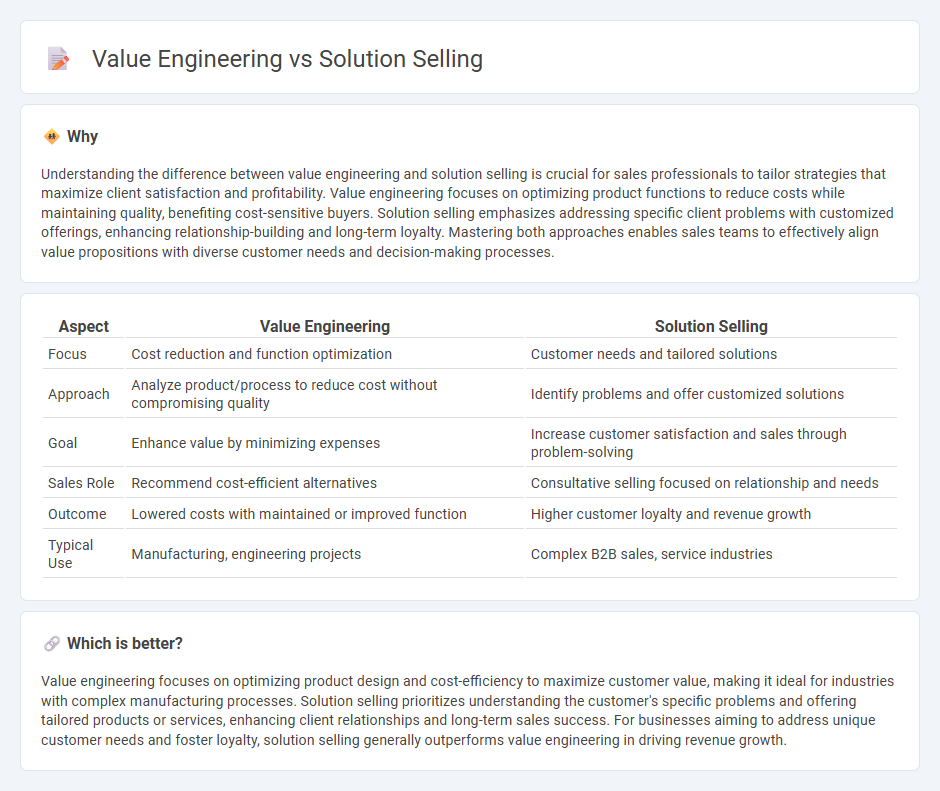
Value engineering focuses on optimizing product or service functions to reduce costs while maintaining quality, targeting efficiency and cost-effectiveness in sales strategies. Solution selling emphasizes understanding customer needs and delivering tailored solutions that address specific challenges, enhancing customer satisfaction and long-term relationships. Discover more about how integrating value engineering and solution selling can transform your sales approach.
Why it is important
Understanding the difference between value engineering and solution selling is crucial for sales professionals to tailor strategies that maximize client satisfaction and profitability. Value engineering focuses on optimizing product functions to reduce costs while maintaining quality, benefiting cost-sensitive buyers. Solution selling emphasizes addressing specific client problems with customized offerings, enhancing relationship-building and long-term loyalty. Mastering both approaches enables sales teams to effectively align value propositions with diverse customer needs and decision-making processes.
Comparison Table
| Aspect | Value Engineering | Solution Selling |
|---|---|---|
| Focus | Cost reduction and function optimization | Customer needs and tailored solutions |
| Approach | Analyze product/process to reduce cost without compromising quality | Identify problems and offer customized solutions |
| Goal | Enhance value by minimizing expenses | Increase customer satisfaction and sales through problem-solving |
| Sales Role | Recommend cost-efficient alternatives | Consultative selling focused on relationship and needs |
| Outcome | Lowered costs with maintained or improved function | Higher customer loyalty and revenue growth |
| Typical Use | Manufacturing, engineering projects | Complex B2B sales, service industries |
Which is better?
Value engineering focuses on optimizing product design and cost-efficiency to maximize customer value, making it ideal for industries with complex manufacturing processes. Solution selling prioritizes understanding the customer's specific problems and offering tailored products or services, enhancing client relationships and long-term sales success. For businesses aiming to address unique customer needs and foster loyalty, solution selling generally outperforms value engineering in driving revenue growth.
Connection
Value engineering enhances sales effectiveness by identifying cost-saving opportunities and improving product functionality, which aligns with solution selling's focus on addressing customer needs through tailored solutions. Both approaches prioritize maximizing customer value and ensuring product offerings deliver measurable benefits, driving higher customer satisfaction and increased sales. Integrating value engineering into solution selling enables sales teams to present optimized, cost-efficient solutions that resonate with buyers' strategic goals.
Key Terms
**Solution Selling:**
Solution selling centers on identifying customer needs and tailoring products or services to address specific business challenges, driving increased customer satisfaction and loyalty. It emphasizes consultative communication and relationship-building over transactional sales, resulting in higher closing rates and long-term partnerships. Discover how solution selling transforms client interactions and boosts revenue generation.
Needs Assessment
Solution selling emphasizes an in-depth needs assessment to tailor products or services that directly address specific customer pain points and business objectives. Value engineering focuses on evaluating functions to reduce cost while maintaining or enhancing performance, often requiring technical analysis during the needs assessment phase. Explore detailed strategies to optimize needs assessment in both solution selling and value engineering for better client outcomes.
Consultative Approach
Solution selling centers on identifying customer needs and tailoring products or services to solve specific problems through a consultative approach. Value engineering emphasizes optimizing product function and cost-effectiveness while maintaining quality, often involving cross-disciplinary collaboration to enhance value. Explore how integrating consultative techniques in both methodologies can drive superior client outcomes and strategic business growth.
Source and External Links
Value Selling vs. Solution Selling: Why Value Wins - Solution selling is a sales methodology that focuses on identifying customer pain points and positioning products or services as tailored solutions to address those specific problems.
Solution Selling vs. Consultative Selling: Key Differences - Solution selling is most effective when clients have clearly defined challenges and need customized solutions, such as in complex technical, industry-specific, or new product launch scenarios.
Solution Selling: What It Is & How to Do It Effectively - Solution selling involves a structured process of prospecting, qualifying, diagnosing needs, presenting tailored solutions, and closing deals based on the prospect's specific business problems.
 dowidth.com
dowidth.com